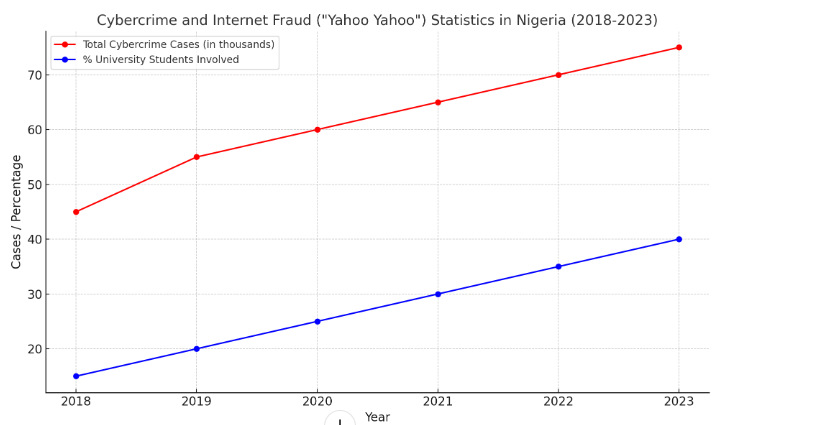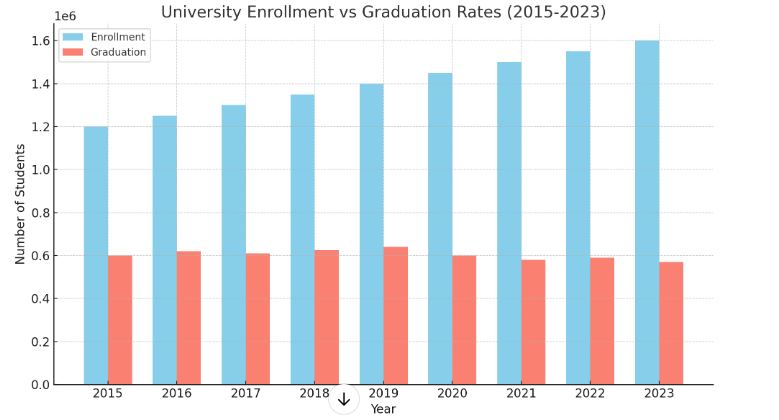[By Idowu Faleye: +2348132100608]
Today, a troubling shift has emerged among Nigerian youth, especially those in universities. This shift threatens the moral fabric of the nation and has dangerous implications for the future of leadership in the country. We are witnessing a generation of young people drifting further away from the path of integrity, lured by the mirage of quick wealth, and the consequences are devastating. It’s hard not to feel a sense of urgency for action.
Let me introduce you to Segun, a 19-year-old in his second year at a popular university in one of Nigeria’s southwestern states. His story represents a growing problem that haunts many Nigerian families today. Segun, the eldest son of a deeply religious Christian family, had a promising start. His father is a Pentecostal pastor, and his mother is a senior-level public servant. Segun did well in secondary school and immediately gained admission into the university at 17. At home, he was actively involved in church activities, and fervently devoted to his faith. But the moment he stepped onto campus; his life began to change in ways no one could have predicted.

Soon after settling into university life, Segun found himself in the wrong company. A group of friends introduced him to internet fraud, commonly referred to as “Yahoo.” What started as small schemes quickly escalated, and before long, Segun was worth over 70 million Naira. With his newfound wealth, Segun bought a car worth 14 million Naira and began acquiring properties. He now owns 12 units of two-bedroom flats. Yet, despite all this, he continues to collect school fees and money from his unsuspecting parents. Segun still attends church with his family when he visits home, playing the part of the obedient, hardworking son. But in truth, Segun is no longer the same person. His visits home have become less frequent, and he always finds an excuse to leave quickly.
While Segun’s story is disturbing, it is not unique. The pressure to match the success of peers drives many Nigerian youths down dark paths. Segun’s friend, Tolu, also ventured into internet fraud but didn’t achieve the same level of success. Envy began to consume him. In a desperate attempt to outdo Segun, Tolu sought out a more sinister path – rituals, known locally as “Yahoo Plus.” Ritual money schemes often require human sacrifice, and in Tolu’s case, his girlfriend Bimbo became the victim. Bimbo, like Segun, came from a strict Christian home, but university life had led her astray. She was fascinated by Tolu’s lavish lifestyle, and soon, her infatuation would cost her life. Tolu used her for a ritual sacrifice, and her death became known when the stench of her decaying body alerted neighbours.
Read Also: The HND-BSc Dichotomy Debate: Unveiling the Consequences.
This is the terrifying reality facing Nigeria today. Stories like Segun’s and Tolu’s have become all too common in Nigerian universities, where young men and women, once full of promise, are derailed by the pursuit of quick money. Internet fraud and ritual killings have become a widespread plague among Nigerian youth. What was once regarded as rare, shocking occurrences are now almost normalized.
The obsession with wealth at any cost is eating away at the moral foundation of Nigerian society. The universities, which were meant to be centres of knowledge and character building, are now becoming breeding grounds for fraudulent activities. Many students no longer see education as a means to a better future. Instead, they are focused on getting rich fast, even if it means sacrificing human lives. The shocking contrast between academic life and the extravagant lifestyles of students is jarring. It’s not uncommon to see students arriving at lectures in convoys of luxury cars, living in lavish apartments, and spending money at levels far beyond what their peers can afford. How do these students, supposedly full-time learners, manage to afford such luxury? The answer is as disturbing as it is obvious.

The chart above illustrates the trend in cybercrime and internet fraud (Yahoo) in Nigeria from 2018 to 2023, with a focus on the involvement of university students. The red line represents the total number of cybercrime cases in thousands, while the blue line shows the percentage of university students involved in these crimes
The effects of this quick-money culture reach deep into society. Parents, both educated and uneducated, have begun to turn a blind eye to the dubious sources of their children’s wealth. Some even celebrate it as a blessing from God. Mothers of internet fraudsters have formed associations, and religious leaders, especially in some white garment churches, pray for more success in these illegal ventures, disguising their involvement under the guise of prosperity. Society as a whole has become complicit. Wealth is worshipped, and the means by which it is acquired is of little consequence to many. Nightclubs, banks, motor dealers, and businesses eagerly await the patronage of these young fraudsters, silently rooting for their success.
The exploitation of teenage girls for ritual purposes is another horrific consequence of this growing trend. Bimbo’s story is one of many. Female students, often lured by promises of wealth and comfort, become pawns in this deadly game. They are reduced to commodities, and their lives are seen as expendable in the pursuit of riches. This dangerous moral decay raises serious questions about Nigeria’s future. What kind of leaders will emerge from a generation that has been consumed by greed and a lack of ethical grounding?
Unfortunately, the decay doesn’t stop at internet fraud and rituals. A more subtle, yet equally damaging practice has taken root in Nigerian universities: “sorting.” This practice involves bribing lecturers to pass exams instead of earning grades through honest study. Students who participate in sorting quickly learn that success can be bought, and integrity is unnecessary. Lecturers, in turn, become complicit in this academic decay, some are even respecting students who flaunt wealth, regardless of how it was earned.
The psychological toll of these trends is severe. For those involved in rituals, the guilt and trauma can be overwhelming. Many suffer from long-term mental health issues, haunted by the blood on their hands. The effects ripple through their lives, affecting relationships, careers, and mental well-being. For those who engage in fraud, the pressure to maintain their lifestyle can lead to dangerous cycles of crime and drug abuse. The use of hard drugs like cocaine, tramadol, and marijuana has skyrocketed among university students, further deteriorating their physical and mental health.

Here is a visualization chart showing university enrollment versus graduation rates from 2015 to 2023, based on hypothetical data from the Federal Ministry of Education. The chart highlights the gap between the number of students enrolling in universities and those successfully graduating, which could reflect the impact of distractions like fraud, materialism, and non-academic engagements on academic performance.
What’s most alarming is that while Nigerian youths are chasing wealth through fraudulent and ritualistic means, their counterparts in other parts of the world are being prepared for leadership. In developed nations, young people are encouraged to focus on education, skill acquisition, and innovation. The global economy is increasingly driven by digital technology and entrepreneurship, but Nigeria’s youth, instead of positioning themselves to compete, are being derailed by destructive pursuits. What does this mean for Nigeria’s future? Will the nation be left behind as others advance?
Nigeria’s failure to adequately prepare its youth for leadership is becoming glaring. If these trends continue unchecked, there will be a leadership vacuum in the future. Who will lead Nigeria when this generation of quick-money seekers and ritualists comes of age? The future looks bleak unless drastic measures are taken to address this growing crisis.
Read Also: Prioritize Digital Skills In Nigeria’s Education Curriculum For Future-Ready Workforce
Society, too, is complicit in this decay. Too often, the attitude towards internet fraud and money rituals is one of nonchalance. It is brushed off as “youthful exuberance,” or worse, seen as an acceptable means of survival in a harsh economic climate. This tolerance, whether from cultural acceptance or societal pressure, is dangerous. By turning a blind eye, society is endorsing a generation of young people who prioritize wealth over hard work, integrity, and learning.
The silence from parents, educators, and policymakers is deafening. This isn’t just a problem of today; it’s a crisis that will shape Nigeria’s future. The country cannot afford to lose its next generation of leaders to such destructive behaviours. To confront these issues head-on, the responsibility lies with all of us – parents, schools, religious leaders, and society at large.
Read Also:Exploring the dichotomy between Character and Reputation
In today’s digital age, parenting requires a more proactive approach than in past decades. The internet connects young people to a vast array of global influences, some of which can lead them down negative paths, including internet fraud. Seemingly innocent children may engage in these activities without detection. To address this, parents need to embrace e-parenting by actively engaging in their children’s online activities, social media interactions, and digital friendships. This means ensuring open access to their digital devices, linking their email accounts, asking frequent questions, and listening to their online conversations.
By staying vigilant, setting boundaries, and maintaining open communication, parents can help ensure their children’s online behaviour aligns with family values. Additionally, parents should acquire basic digital knowledge to monitor these activities effectively. Parenting in the digital era requires commitment and awareness, as the investment made in raising a child is significant and must be protected.
Read Also: Be Wary of World Bank’s Advice: A Cautionary Counsel for Nigeria Government
Parents must begin to question the sources of their children’s wealth, no matter how uncomfortable that conversation may be. Educators need to return to the basics of teaching integrity, discipline, and hard work. Religious leaders must stop turning a blind eye to ill-gotten wealth, and society must stop glorifying materialism and start valuing ethical success.
There is hope, however. By addressing these issues now, Nigeria can begin to steer its youth back on the path of leadership, innovation, and moral integrity. It will require a collective effort, but it’s not impossible. If we fail to act, we risk a future led by a generation that sees nothing wrong with violence in the pursuit of wealth. The question we must all ask ourselves is: Who will save this generation? And by extension, who will save Nigeria’s future?
The time to act is now. It’s a plea for the soul of a nation, for the promise of a better tomorrow, and for the very future of Nigeria itself.
References:
Federal Ministry of Education (Nigeria). (2023). University Enrollment and Graduation Statistics.
National Universities Commission (NUC). (2022). Annual Report on University Performance in Nigeria.
Adebayo, T. (2021). The Influence of Internet Fraud and Materialism on Academic
Ojedokun, S., & Eraye, J. (2020). Youth Engagement in Cybercrime and its Impact on Higher Education in Nigeria.
World Bank. (2022). Higher Education in Nigeria: Trends and Challenges.
Oladejo, M. (2020). Parental Involvement in Digital Monitoring: Safeguarding University Students in the Information Age.
Born in Ekiti State, Nigeria, Idowu Faleye is a Policy Analyst and IBM-certified Data Analyst with an academic background in Public Administration. He’s the Lead Analyst at EphraimHill Data Consult and the Publisher of EphraimHill DataBlog, which posts regular topics on issues of public interest. He can be reached via WhatsApp at +2348132100608 or email at ephraimhill01@gmail.com
© 2024 EphraimHill DC. All rights reserved.











































![The Trend of Insecurity in Nigeria. [Part 2]](https://ephraimhilldc.com/wp-content/uploads/2024/09/Computer-Monitoring-of-Remote-areas.png)



































